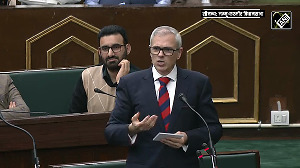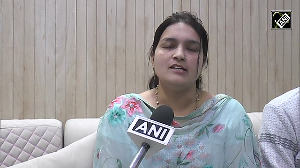 Last week, Chandra Shekhar Verma did something rather uncharacteristic for a state-owned company chieftain, especially one reputed to be a stickler for rules.
Last week, Chandra Shekhar Verma did something rather uncharacteristic for a state-owned company chieftain, especially one reputed to be a stickler for rules.
The Steel Authority of India (SAIL) chairman - its youngest ever - openly criticised the government.
The lodestone of his ire: a decision by a group of ministers to make mandatory the sharing with the local populace 26 per cent of the profits from mines. Verma insists that captive mines should be kept out of the proposal.
Though 51-year-old Verma joined SAIL on June 11, it was only last week that people sat up and took notice. His logic for opposing the proposal was simple: for SAIL, there is no profit from mined iron ore; it has only captive use in steelmaking.
In the case of captive mining, profit centres cannot be clearly demarcated unless mining is undertaken by a company distinct from the steel or power production of the parent company.
Although Verma has the support of Steel Minister Virbhadra Singh on the issue, Mining Minister BK Handique has said there would be no exceptions to the rule.
So, steel companies may end up falling in line. After all, iron-ore mines were given to them in return for nothing, except a royalty payment on production.
Verma's comment, nonetheless, reflects the practical problems that companies like SAIL will face if the profit sharing comes into force. And with illegal mining (especially of iron ore), environmental issues and land acquisition becoming major areas of concern, the chairman's views only highlight the industry's wide-ranging apprehensions.
Verma, who heads the country's largest steel producer, says he will now work towards collating the industry's views and wants to present them to the government before a final decision on the proposed legislation is taken.
What ultimately happens will be important for SAIL, where he faces the challenge of deploying increasingly scarce resources while strengthening the company's competitiveness.
A fellow of the Institute of Company Secretaries of India and of the Institute of Cost & Works Accountants of India, Verma is a man who believes in keeping tight grip on the purse strings. SAIL insiders say his soft demeanour may be deceptive - he takes tough decisions and follows through on them.
At his last job at Bharat Heavy Electricals Ltd, where he was director (finance), Verma was known to play exclusively by the book. At SAIL, too, he is bringing about a culture of accountability.
Verma is an outsider at SAIL, just as he was at BHEL - it contributed to the not-so-popular nature of his tenure there. Prior to joining BHEL, Verma was director (finance) at ITI, the public sector telephone manufacturer.
His hard-nosed attitude towards finance was honed as group general manager of Indian Railway Finance Corporation and general manager of Delhi Stock Exchange.
With SAIL implementing a Rs 70,000 crore (Rs 700 billion) modernisation and expansion plan at its plants and mines, while preparing for divestment of 10 per cent of government equity, Verma's current assignment is his toughest yet. Perhaps his stand on profit sharing has helped establish this rank outsider as a steel man.






 © 2025
© 2025